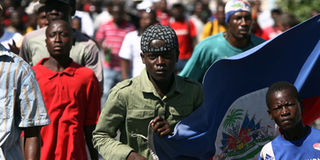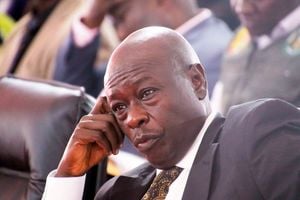Cholera riots spread to Haiti capital

Haitian protest against the United Nations peacekeepers on November 18, 2010 in Port-au-Prince. Gangs of angry Haitians trawled Port-au-Prince as violence aimed at UN peacekeepers blamed for the cholera crisis spread to the capital after deadly rioting in the north. AFP PHOTO / HECTOR RETAMAL
Port-au-Prince, Friday
Rioting has spread to the Haitian capital where hundreds of people clashed with UN troops they blamed for a worsening cholera epidemic.
Stone-throwing youths raced through the rubble-strewn streets of fetid camps built for earthquake survivors as UN peacekeepers in armoured trucks fired tear gas on the crowds in running clashes that lasted several hours.
Sporadic gunfire echoed through the quake-ravaged streets of the capital as demonstrators blocked roads with burning tyres and dumpsters overflowing with rotting garbage.
“The UN came here to kill us, to poison us,” shouted Alexis Clerius, a 40-year-old farmer, as he erected a barricade in the main Champ de Mars square.
Organisers had urged people to vent their anger at the United Nations and Haitian authorities over the cholera outbreak, which has killed more than 1,100 people since it began in late October.
The powder keg situation stems from claims the cholera emanated from septic tanks at a base for Nepalese UN peacekeepers in central Haiti, leaking into the Artibonite River, where locals drink, wash clothes and bathe.
The UN says it tested some of the Nepalese and found no trace of cholera, while health officials say it is impossible to know and the focus must be on containing the epidemic and not divining its source.
President Rene Preval has pleaded for calm and denounced unnamed groups for taking advantage of the cholera to stir tension ahead of November 28 national elections to choose his successor.
Fuelled by rumour
But anger, fuelled by rumour, was running high in Port-au-Prince and in northern Haiti, the epicentre of the cholera outbreak and where deadly riots first broke out earlier this week, leaving three people dead.
“It’s all (the United Nation’s) fault. We know the Nepalese were sloppy and that’s why we’re sick, and now they are being bullies,” said Seraphine Macoult, 36, a teacher whose daughter was a cholera patient at a medical centre in northwest Haiti.
The UN peacekeeping force MINUSTAH has warned people not to be manipulated by “enemies of stability and democracy.”
But in the poorest country in the Americas — even before the January earthquake shook the capital to rubble and killed 250,000 people — MINUSTAH is a highly visible presence and a target of widespread frustration.



